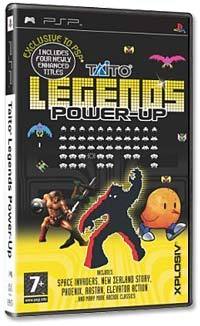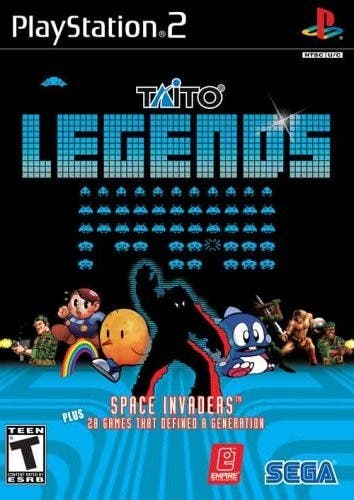The Retro Industry
Making money from old rope.
"To be honest, I think it's a bit of both. The huge sales of titles like the Midway Collections and our own Taito Legends at XPLOSIV prove people do want to play the games they played when they were younger. But it'd be a disaster if we just grabbed old games at random and put them together on a disk. We need to know what games people loved, and provide accordingly. Like I said, we simply can't manufacture 20-years of appeal, so we've got a difficult task when it comes to understanding which retro games will flourish again, and which people have deliberately tried to forget!" laughs Sean, happily resigned to the conundrum faced by all publishers and developers who're trying to provide for the fickle mature gamer.
And indeed we are fickle. As already discussed, there's a certain intangible quality that we, as retro gamers, can't even define, yet fully expect when we pay once again for an old game. Taito Legends and Midway Collections may have proven popular, but enough other retro titles have failed to recapture their glory by missing out on some elusive aspect of their re-re-re-release.
This also begs the question that maybe the retro industry itself is a fad - that we capricious players will once again clamour for the next new innovation, as we did when we callously (and, in retrospect, unadvisedly) cast lush 2-D games to the wind in favour of lifeless 3-D titles of the early ‘90s.
"In this modern, busy lifestyle a simple but addictive game is perfect to fit into the 20-minutes of free time most people have got these days. If for no other reason than that, I think "retro" is here to stay. There'll always be gamers wanting to play older games, but just as many who'll want to play fast, addictive games, which makes these two aspects of the industry so wonderfully compatible." explains Sean.

Indeed, the term "retro" has taken on a meaning and connotation all of its own due to the massive, global revival culture that's permeating our entertainment mediums. The word "antique" might just about suit in terms of literal definition, but lacks the useable, regenerative nature of classic games. Neither does simply calling them "old" instil the correct sense of fun we know to be true of a great game, so instead we've adopted the categorically ambiguous word "retro" and saturated it with new sentiment.
Because of this new definition of an old word, we have the liberty of leaving the boundaries of its meaning in a state of flux. When exactly does something become retro? What is it if it's now too old to be retro? If we're honest, we don't want these questions answered, as that would interfere with the nebulous quantification of childhood we're enjoying right now. But, according to Sean, retro is also open to progression - a concept which at first seems contradictory, but isn't necessarily so.
"Retro will evolve. It already has done. A few years ago it was all about original arcade machines and 8-bit games. Now it's 16-bit that's proving massively popular, with Megadrive and SNES titles appearing on the Wii and X360. Soon it will be PSOne collections. As current technology moves forward, so does its capability to recreate the advancements seen 20-years ago. For us, that's one of the real beauties of being involved in the retro industry!
"But that's not to say we can just sit back and follow a simple, linear progression of releases. We have to look at all opportunities for all formats, and weigh up the market for each release and see where each title fits best. It's the difference between deciding whether a game will be best received as part of a multi-format, commercial collection, or whether it'd stand alone on a download platform. Double Dragon, for example, is a great start for Empire on XBLA and we have the hugely popular Speedball II coming soon. Luckily we have the legendary Bitmap Brothers handling the XBLA version of Speedball II so the game is in the best possible hands. But these are powerful, respected titles that demand to be released under their own weight, and not as headliners on a collection. We have to be very careful to respect the way gamers feel about certain games, even if they're not particularly conscious of it themselves." says Sean.

As a massive Double Dragon fan, I can appreciate Sean's point quite personally. Seeing the conversion bearing up under its own formidable weight on XBLA feels like a fitting testament to a classic coin-op. Seeing it being used to shore up a host of anaemic titles on another compilation would betray my sentiment of what a great game it was. Of course, I place absolutely no conscious thought into this as I pick up a controller - I simply want what I want, and fully expect the industry to provide it without question or hesitation!
And, it seems, we're also generating subtle undercurrents within the retro industry. Genres are re-explored, while others seem to lull. Then, as Sean himself let slip, other games are totally dissected and prepared anew for the next generation of gamers; a cunning tactic that allows us, the mature obsessives, to knock gaming elbows with the younger, casual twitch players (the majority of whom are our own, beleaguered offspring). Speedball is the prime example, as Sean himself explains.
"Speedball II is a true gaming great with a very dedicated and loyal fan base. It's still one of the best 'sports' games available, with its frantic action and competitive gameplay. It was actually an independent decision, away from the updated PC version, to put this onto XBLA. We feel that the game, in its original state, is the one that everyone's crying out for on Live. As well as getting the classic version of Speedball II, exactly as people know and love it, they'll also get an HD version with newly modelled players and arenas all in shiny high definition.
As mentioned previously, the Bitmap Brothers are handling the development of the XBLA version of Speedball II so we get the exact game the fans love and the attention to detail that only the Bitmaps can bring to this title. It's our intention and hope that we'll be providing the retro experience people really cherish, while still giving them something new. For me, that's the pinnacle of a good retro game; personally and from a business perspective."
It seems that publishers and developers of retro games must face a delicate balancing act, with continuously shifting rules set by a market that, by its very definition, refuses to adhere to established trends. But so long as we keep our playing habits fresh and varied, researching the depths of classic gaming and not simply splashing around in the shallow end with repetitious talk of Street Fighter 2, Sonic and Mario, we're inadvertently refining the future retro market and sustaining our gaming enjoyment for years to come.